-
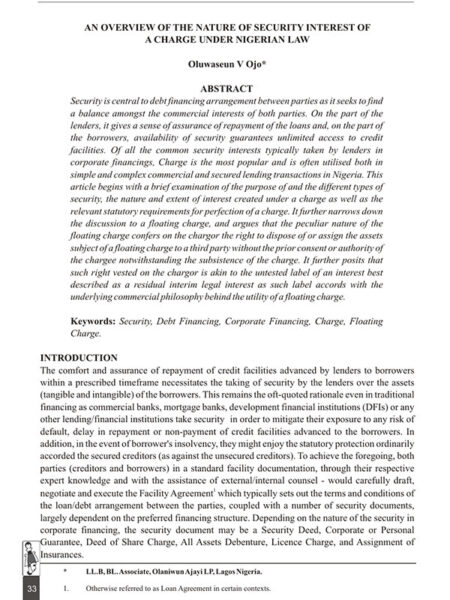
An Overview of the Nature of Security Interest of a Charge under Nigerian Law
0₦2,500.00Oluwaseun Ojo, Associate at Olaniwun Ajayi LP undertakes An Overview of the Nature of Security Interest of a Charge under Nigerian Law. He observes that security is central to debt financing arrangement between parties as it seeks to find a balance amongst the commercial interests of both parties. On the part of the lenders, security gives a sense of assurance of repayment of the loans and, on the part of the borrowers, availability of security guarantees unlimited access to credit facilities. Of all the common security interests typically taken by lenders in corporate financings, the Charge is the most popular. It is often utilised both in simple and complex commercial and secured lending transactions in Nigeria. Ojo examines the purpose of and the different types of security, the nature and extent of interest created under a charge and relevant statutory requirements for perfection of a charge.
-
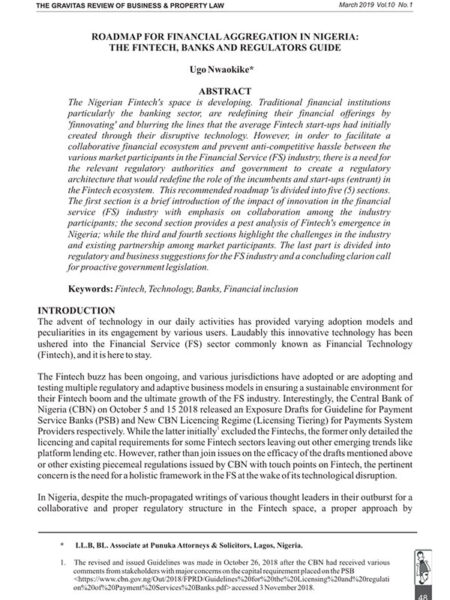
Roadmap for Financial Aggregation in Nigeria: The Fintech, Banks and Regulators Guide
0₦2,500.00Ugo Nwaokike, Associate<, Punuka Attorneys and Solicitors in his article, Roadmap for Financial Aggregation in Nigeria: The Fintech, Banks and Regulators Guide, considers that traditional financial institutions are redefining their offerings to overcome the initial head start fintech start-ups had with their disruptive technology. However, to facilitate a collaborative financial ecosystem and prevent anti-competitive hassle between the various market participants in the financial services industry, there is a need for a regulatory architecture that would redefine the role of the incumbents and entrants in the fintech ecosystem. He examines the challenges in the fintech industry and existing partnership among participants while recommending legislative, regulatory and business measures to achieve a collaborative and cohesive industry.
-
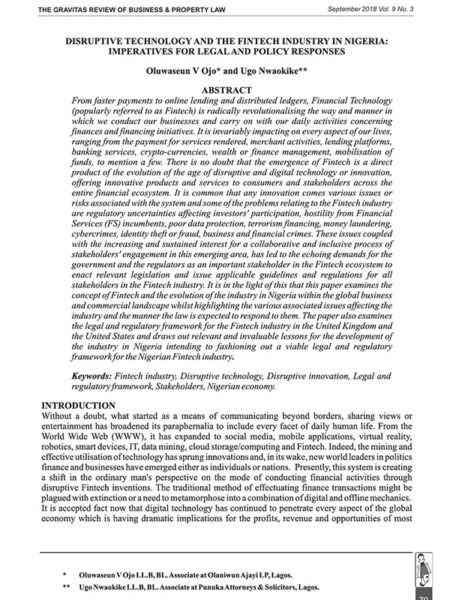
Disruptive Technology and the Fintech Industry in Nigeria: Imperatives for Legal and Policy Responses
0₦2,500.00Oluwaseun Ojo of Olaniwun Ajayi LP, and Ugo Nwaokike of Punuka Attorneys and Solicitors in their article, Disruptive Technology and Fintech Industry in Nigeria: Imperatives for Legal and Policy Responses, note that the emergence of Financial Technology (popularly referred to as Fintech) is a direct product of the age of disruptive and digital innovation. Fintech is impacting on every aspect of lives, ranging from payment for services, merchant activities, lending platforms, banking services, crypto-currencies, wealth and finance management. They appraise issues affecting the Fintech industry in Nigeria including regulatory uncertainties affecting investors’ participation, hostility from Financial Services (FS) incumbents, poor data protection, terrorism financing, money laundering, cyber crimes, identity theft and financial crimes. They review the legal and regulatory framework for the Fintech industry in the United Kingdom and the United States and draw out relevant lessons for the development of the sector in Nigeria.
-
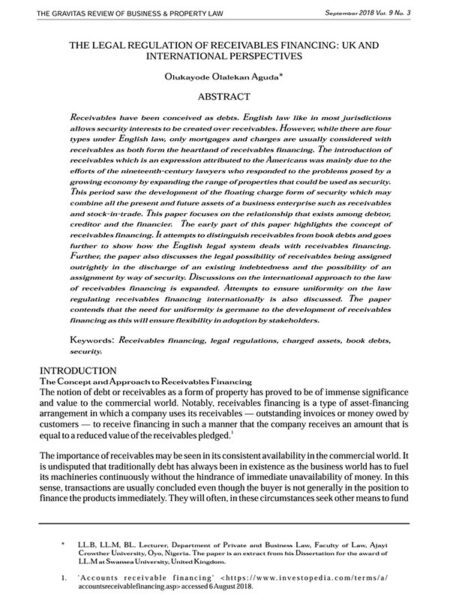
The Legal Regulation of Receivables Financing: The UK and International Perspectives
0₦2,500.00Olukayode Aguda, Lecturer, Department of Private and Business Law, Ajayi Crowther University, Oyo in his article, The Legal Regulation of Receivables Financing: the UK and International Perspectives, notes that receivables are a businessman’s most liquid assets. He highlights the concept of receivables financing, distinguishes receivables from book debts and goes further to show how the English legal system deals with receivables financing. He discusses the legal possibility of receivables being assigned outrightly in the discharge of existing indebtedness and the possibility of an assignment by way of security. He explains the laws of different jurisdictions relating to receivables financing, and international attempts at ensuring uniformity of the law
-
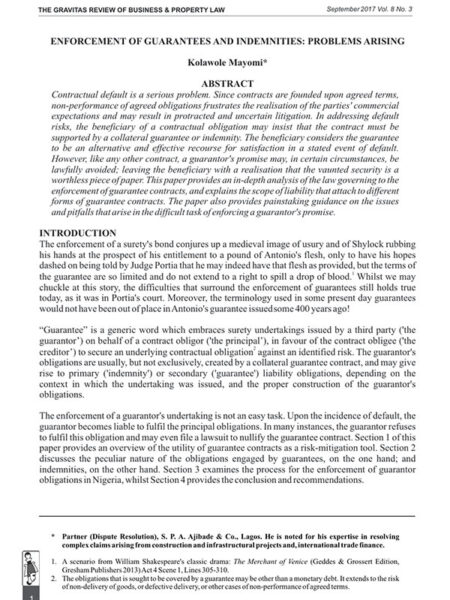
Enforcement of Guarantees and Indemnities: Problems Arising
0₦2,500.00Kolawole Mayomi, Partner S.P.A. Ajibade & Co in his article, “Enforcement of Guarantees and Indemnities: Problems Arising” provides an in-depth analysis of the law relating to guarantees and indemnities. He notes that while the law relating to guarantee and indemnity contracts in Nigeria is case driven, the courts have conflated the principles undergirding them. The consequences being opening up a guarantor to unconditional liability or imposing onerous obligation on the creditor holding an indemnity contract. He examines how risks are covered, the difference between guarantee and indemnity contracts, and grounds for resisting enforcement of each.
-
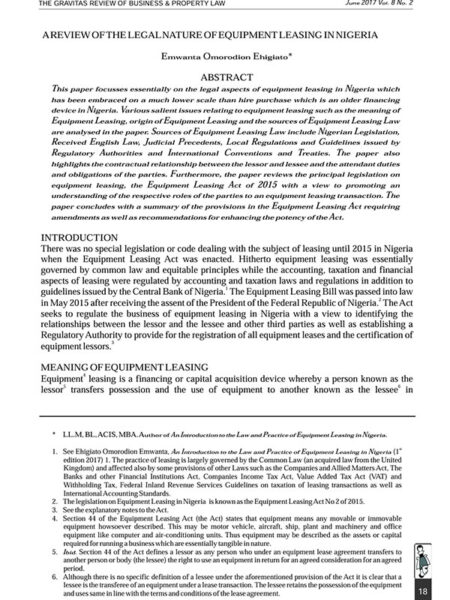
A Review of the Legal Nature of Equipment Leasing in Nigeria
0₦2,500.00Emwanta Ehigiato, author of An Introduction to the Law and Practice of Equipment Leasing in Nigeria in his article, “A Review of the Legal Nature of Equipment Leasing in Nigeria”, explores the legal aspects of equipment leasing which has been embraced on a much lower scale than hire purchase which is an older financing device in Nigeria. He analyses the legal framework for equipment leasing, the structure of an Equipment Lease Contract and obligations of parties. The paper undertakes a comprehensive review and commentary on the provision of the principal legislation on equipment leasing in Nigeria, Equipment Leasing Act of 2015.
-
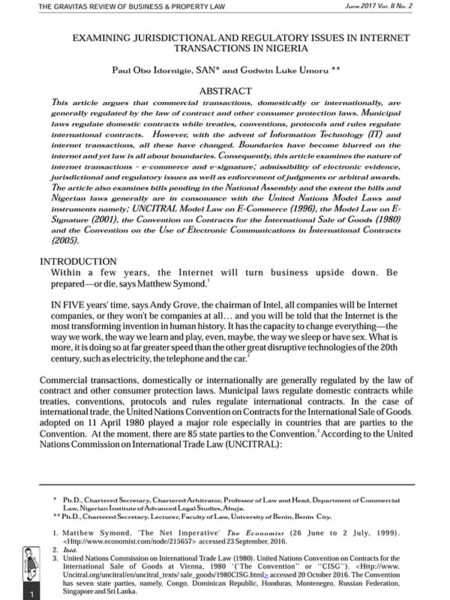
Examining Jurisdictional and Regulatory Issues in Internet Transactions in Nigeria
0₦2,500.00Professor Paul Idornigie SANof the Nigerian Institute of Advanced Legal Studies and Dr Godwin Umoru of the University of Benin in their article “Examining Jurisdictional and Regulatory Issues in Internet Transactions in Nigeria”, examine the extra-territorial nature of internet transactions and the challenges of applicable law, admissibility of electronic transmissions in evidence, enforceability of judgments, and how internet transactions are regulated. The article examines bills pending before the 8th National Assembly and the extent the bills and Nigerian laws generally conform to international conventions and protocols including the UNCITRAL Model Law on e-Commerce, the Model Law on E-Signature, the Convention on Contracts for the International Sale of Goods and the Convention on the Use of Electronic Communications in International Contracts.
The Gravitas Review of Business & Property Law



